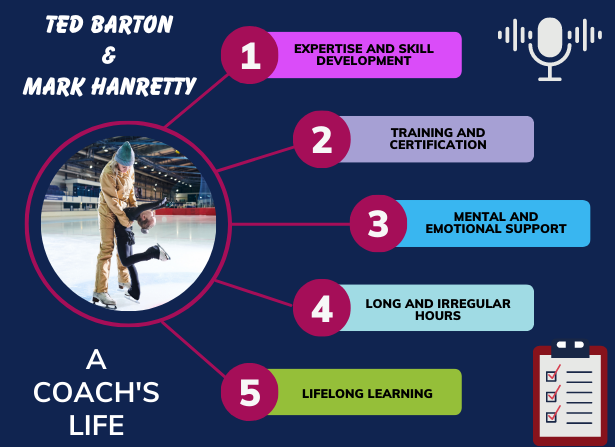Thinking about becoming a figure skating coach?
Join us as Ted Barton and Mark Hanretty discuss the challenges and rewards of being a figure skating coach. Hear their personal experiences and thoughts on teaching “tots” to “high-level” skaters, as well as planning for the future and finding balance in life. They also shed light on issues of pressure, coach-to-student connection, and more!
Being a Figure skating coach is a complex and multifaceted role that goes beyond technical expertise. It requires a combination of teaching skills, interpersonal abilities, and a genuine passion for helping skaters achieve their potential. The demands can vary based on the level of skaters they work with, their coaching style, and the specific goals of their students.
Here’s an overview of what the life of a figure skating coach might entail:
1. Expertise and Skill Development: A figure skating coach typically starts as a skilled and experienced figure skater themselves. They need to have a deep understanding of the technical and artistic aspects of figure skating. Many coaches have backgrounds as competitive figure skaters and have achieved a certain level of proficiency themselves.
2. Training and Certification: Coaches often pursue certifications and training programs to enhance their coaching skills. Many countries have national governing bodies for figure skating that offer coaching certification programs. These certifications help coaches stay up-to-date with the latest techniques, safety protocols, and teaching methodologies.
3. Building Clientele: Building a client base is a crucial aspect of a coach’s career. This involves networking within the skating community, establishing a reputation for quality coaching, and maintaining good relationships with skaters and their families.
4. Individualized Training Plans: Coaches work closely with their skaters to develop customized training plans that suit the skater’s goals, strengths, and weaknesses. This involves designing practice routines, selecting appropriate music and choreography, and setting achievable goals.
5. Technical Instruction: Coaches provide technical instruction to skaters, teaching them jumps, spins, footwork sequences, and other fundamental skills. They break down complex maneuvers into smaller components and provide guidance on proper technique and form.
6. Choreography and Artistry: Coaches also play a role in developing the artistic side of figure skating. They work with skaters to create compelling routines that showcase their strengths and tell a story on the ice.
7. Physical Conditioning: Skaters need to be physically fit and strong to perform demanding routines. Coaches often incorporate off-ice conditioning and strength training into their training plans to help skaters build the necessary physical attributes.
8. Mental and Emotional Support: Figure skating can be mentally and emotionally challenging. Coaches provide guidance and support to help skaters overcome obstacles, deal with competition nerves, and stay focused on their goals.
9. Competition Preparation: Coaches play a crucial role in preparing skaters for competitions. This includes strategizing, setting competition goals, and helping skaters manage their nerves and perform their best under pressure.
10. Long and Irregular Hours: Coaching often involves working long and irregular hours, including early mornings, late evenings, and weekends. This is because skaters often have training sessions outside of regular school or work hours.
11. Travel: If coaching competitive skaters, coaches might travel to various competitions and events to support their athletes. This can involve significant time away from home.
12. Lifelong Learning: The world of figure skating is always evolving, with new techniques, rules, and training methodologies emerging. Coaches need to engage in continuous learning to stay relevant and provide the best possible guidance to their skaters.
Overall, being a figure skating coach requires a passion for the sport, excellent interpersonal skills, a strong work ethic, and a commitment to the growth and success of their skaters. While it can be demanding, it can also be incredibly rewarding to see your students progress and achieve their goals on the ice.

